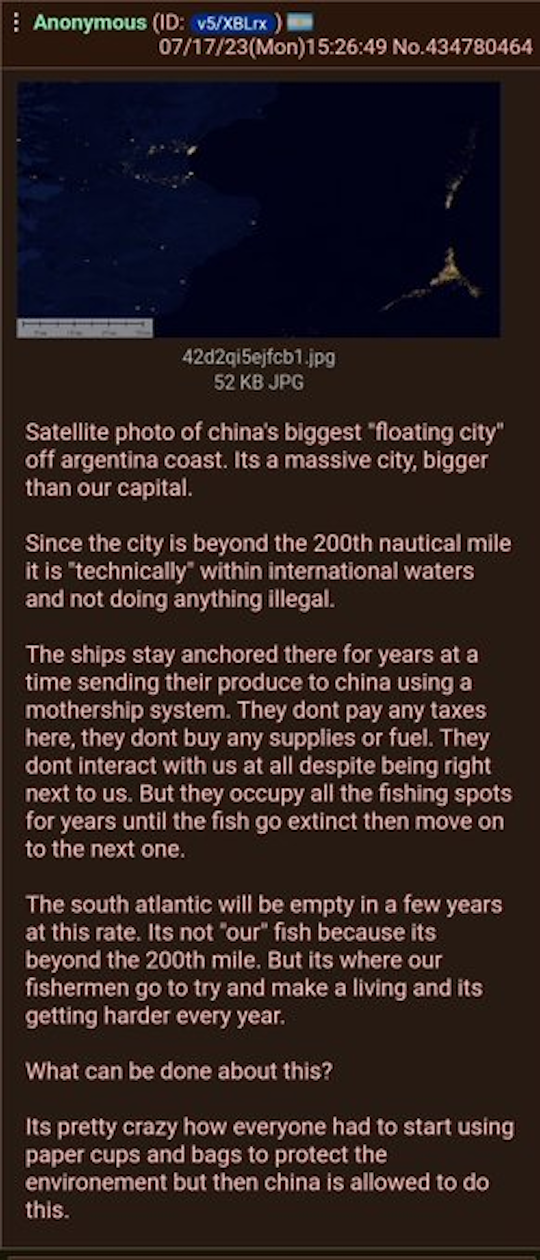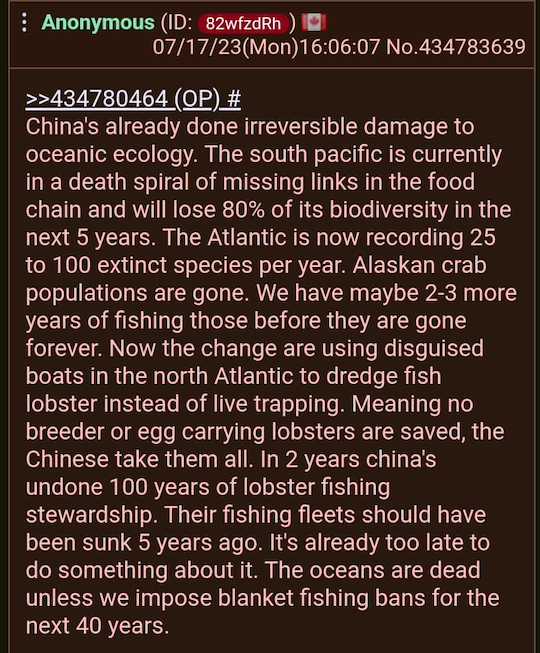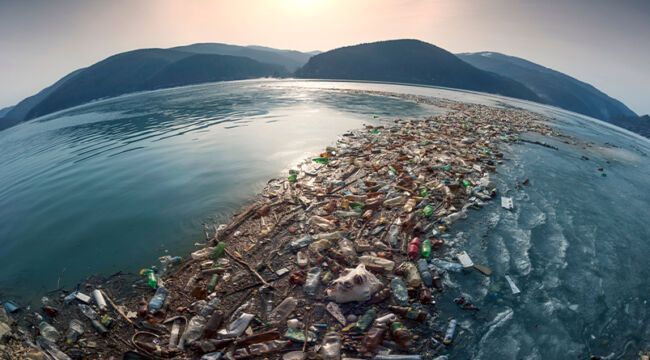China’s Killing the Oceans
Today the Congress of the United States conducted hearings on the existence of extraterrestrial spacecraft…
Today first son Hunter Biden appeared in federal court on criminal charges…
And today the Federal Reserve elevated its target rate by 0.25%.
Which of these subjects shall we tackle? The answer is none. We shall tackle none of them.
We might normally take up the Federal Reserve’s pinprick rate elevation.
Yet what could we say about it that we haven’t said before? Very, very little.
We shall instead take up the environment. That is correct — the environment.
Today we alert you to a potential environmental menace… and it is not “climate change.”
China’s Wrecking the World’s Oceans
We direct you to the following Twitter postings:


Is China wrecking the world’s oceanic ecology to gratify its immediate wants and needs? Is China the common enemy of humanity?
True Environmentalism
Your editor is far from convinced about the existence of a human-induced climate calamity.
Does that render your editor an implacable foe of the natural environment?
In our telling… it does not.
Your editor — in fact — is heart and soul for a responsible stewardship of Earth’s natural resources.
He believes each generation is under bonds to bequeath a relatively intact environment to following generations.
And it appears that China may be breaking these bonds — if reports are accurate.
The Bible and the Environment
None of the foregoing is to argue that each tree must be spared the axe. None of the foregoing is to argue that fish should never be hauled up from the depths.
We put out no such pleas.
It is simply to argue that a reasonable conservation represents an honest stewardship.
Does not the Book of Numbers instruct us thusly?:
You shall not pollute the land in which you live… You shall not defile the land in which you live, in the midst of which I dwell, for I the Lord dwell in the midst of the people of Israel.
And does Ezekiel not ask:
Is it not enough for you to feed on the good pasture, that you must tread down with your feet the rest of your pasture; and to drink of clear water, that you must muddy the rest of the water with your feet?
Many hunters share this understanding. Many lumberjacks share this understanding. Indeed… many fishermen share this understanding.
They share concern for the morrow.
They recognize that overharvesting represents the future death of their livelihoods — and their children’s livelihoods.
Does China share this understanding? The evidence is against it.
China Strip-Mines the World’s Oceans
Claims the United States government:
China’s fishing vessels that engage in illegal, unreported and unregulated (IUU) fishing destroy marine ecosystems. China is also the world’s largest source of plastic pollution, which further devastates fish and ocean life.
Argues the Washington Examiner:
Communist China operates hundreds of thousands of fishing vessels. Operating as vast superfleets, they feed a voracious domestic market and have no regard for sustainability or the interests of other nations…
These fleets travel many thousands of miles from Chinese shores. Rarely concerned with international law or the exclusive economic zones of other nations, the superfleets scour the oceans.
It’s not just the fish that are sucked dry from their habitats — it’s sharks, dolphins and all manner of other marine animals. Whether in the open oceans or in protected marine reserves such as the Galapagos Islands, Chinese fleets care nothing for the chaos they wreak on vulnerable habitats.
The havoc is real. Overfishing and failing to take precautions to protect undesired or developing marine populations, China threatens the very balance of the ecosystem.
Insists a certain Gregory McCann — assistant professor at Taiwan’s Chang Gung University:
In Beijing’s eyes, the oceans are theirs for the taking…
China’s attitude seems to be based on zero-sum thinking, bringing tragic consequences for the ecosystem.
Finally ABC News Australia reports that:
The world’s fisheries are in crisis. The United Nations Food and Agriculture Organization estimates 90% of them are either overfished or at the limit of sustainability, and China is the major player.
By a long way, China has the world’s biggest deep-sea fishing fleet that strip-mines the world’s oceans.
The seas around China have virtually no fish left but the commercial fishing fleet is still huge…
Demand is driving the crisis. China’s rising wealth means seafood, once considered a delicacy, is now widely consumed.
There is little awareness of sustainability in China’s public…
Many experts fear if China and other countries do not change their fishing models, there will be very little left for the next generation.
What China and the Fed Share in Common
This is a financial publication. May we then liken China’s oceanic atrocities to the Federal Reserve’s monetary atrocities?
For years the Federal Reserve wielded its sledgehammer to bludgeon interest rates downward and downward — even to zero.
This it did to coax the economic machinery into activity… and increase consumption.
The business depended upon the expansion of debt — the extravagant expansion of debt.
Yet a debt-based economy steals from the future to gratify today’s wants. It hauls tomorrow’s consumption forward to today.
It depletes the capital stock… and leaves the future empty.
Explains Daily Reckoning contributor Charles Hugh Smith:
Debt has one primary dynamic: Borrowing money to consume something in the present brings forward consumption and income…
If we choose to consume now, we have less income to save for future consumption or investments. If we sacrifice consumption today, we have more money in the future for consumption or investing…
Is this not China’s fishing policy applied to monetary policy?
The Money of Conservation
As China thieves the future to gratify the present… the Federal Reserve thieved the future to gratify the present.
As China depletes the fishing stock, the Federal Reserve depleted the capital stock.
Each are wastrels in their respective spheres.
We hazard then that sound money — gold — is in one sense the money of the conservationist.
Unlike debt-backed money, sound money encourages the virtues of saving… thrift… deferred gratification. Sound money sets the mind to the future.
Sound money — in essence — conserves.
“From time immemorial proverbial wisdom has taught the virtues of saving,” wrote Henry Hazlitt 74 years ago, “and warned against the consequences of prodigality and waste.”
Today the world is suffering the consequences of prodigality and waste — in its oceans — and in its economies.
Perhaps the world must learn again to save… and conserve…



Comments: